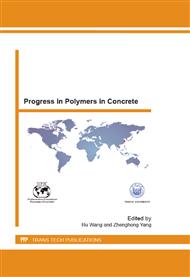p.249
p.255
p.262
p.266
p.274
p.282
p.291
p.298
p.303
Research on the Fatigue Behavior of Cement Asphalt Mortar Exposed to Water
Abstract:
Water erosion is one of the major factors for performance degradation of cement asphalt mortar (abbreviated to CA mortar, or CAM). In this paper, the influence of gap depth, coupling effect of water and pressure on the fatigue behavior of CA mortar was investigated. Results indicated that the damage of bonding surface became more seriously with the increase of gap depth, and when the gap depth was 19 to 38% of the structure size, the destruction exacerbated. Results also indicated that CA mortar was damaged more seriously under the coupling effect of water and pressure; the destruction first occurred on the surface between slab track and CA mortar rather than that between concrete roadbed and CA mortar. Timely repair with epoxy resin prevented the further water erosion well, and improved the service life of CA mortar.
Info:
Periodical:
Pages:
274-281
DOI:
Citation:
Online since:
April 2013
Authors:
Keywords:
Price:
Сopyright:
© 2013 Trans Tech Publications Ltd. All Rights Reserved
Share:
Citation:


